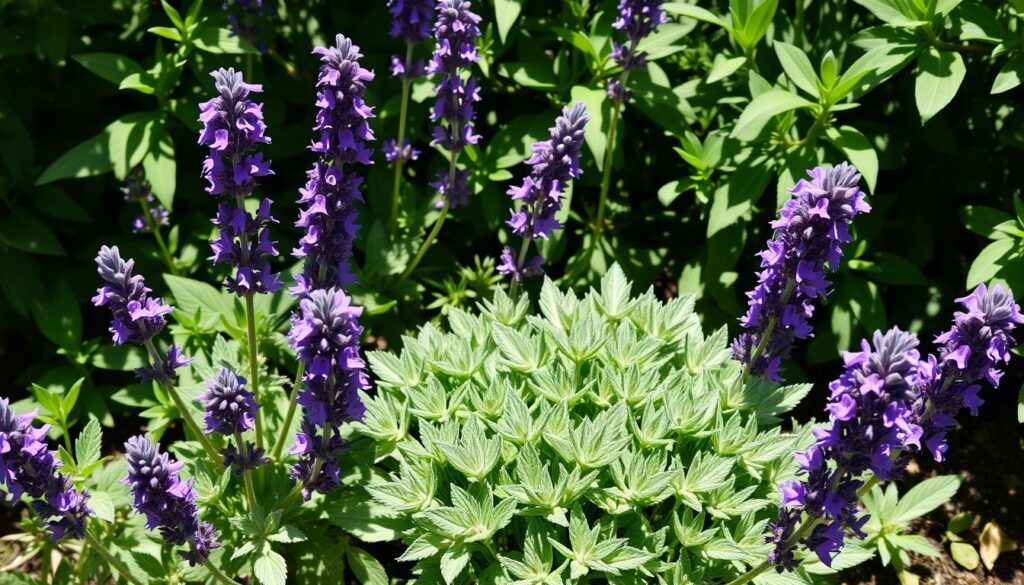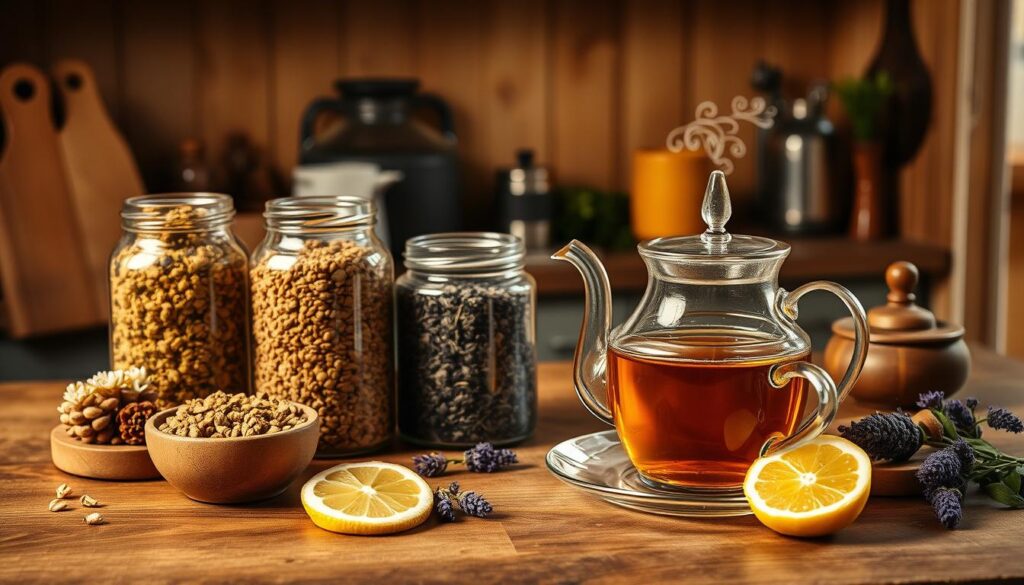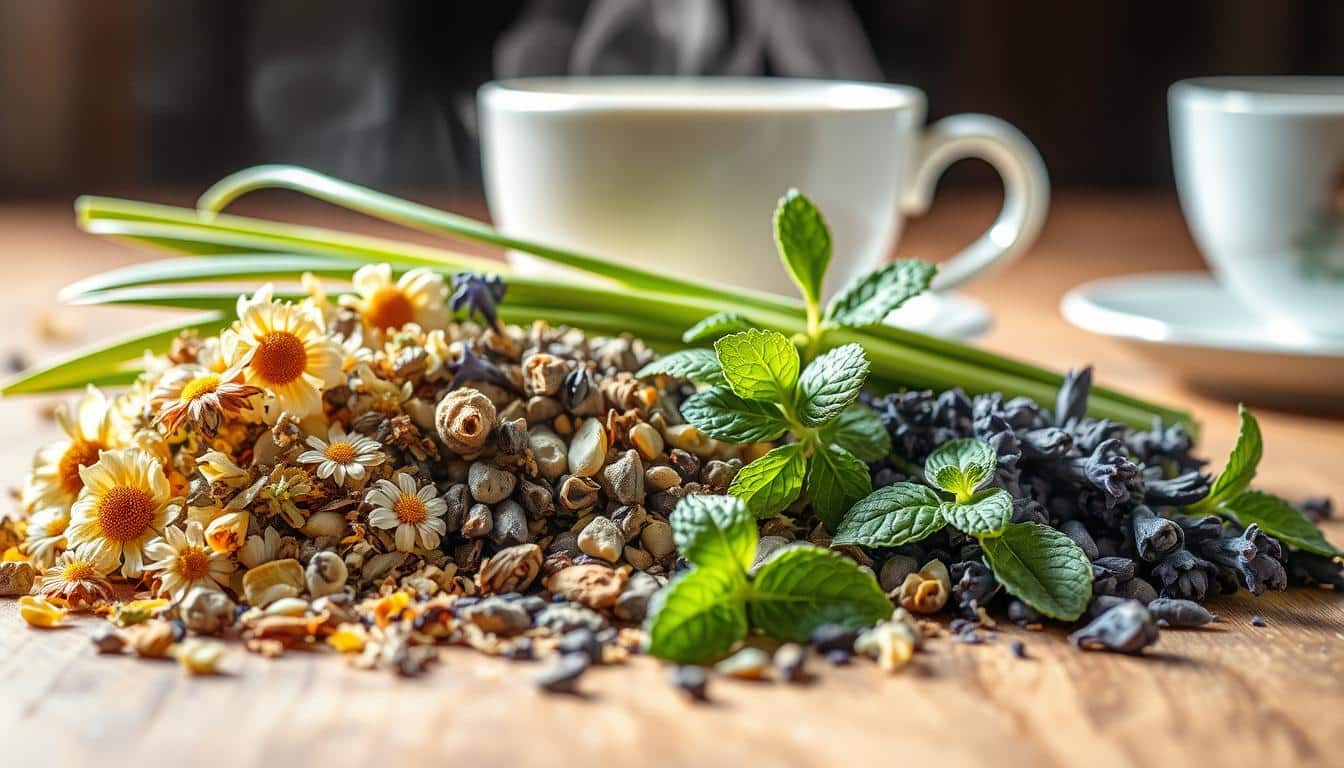What drug is in Sleepytime tea? You’re in luck! Sleepytime tea contains calming herbs like chamomile, valerian root, and passionflower, which naturally promote relaxation. In this article, we’ll explore the ingredients in Sleepytime tea, reveal how these herbs affect your sleep, and answer important questions like, “Is Sleepytime tea safe for everyone?”
Whether you’re curious about its soothing benefits or wondering about potential side effects, there’s plenty to discover. Let’s get started!
Understanding Sleepytime Tea: A Natural Sleep Aid
Herbal sleep remedies like Sleepytime Tea have a long history. They use ingredients that have been helping people sleep for centuries. These natural aids offer a gentle way to improve sleep, combining old wisdom with new science.
Historical Use of Sleep-Inducing Herbs
Chamomile has been used since 500 BC to help people relax and sleep. A 2016 study showed that new moms who drank chamomile tea for two weeks slept better. Another study in 2017 found that older patients who took more chamomile extract slept better than those who took less.
Lavender tea helps lower stress hormones, making sleep more restful. Valerian tea is known for helping with insomnia and anxiety. It can help you fall asleep faster and sleep better. Passionflower tea also helps calm the mind, making it easier to fall asleep by reducing anxiety and insomnia.
Modern Applications for Better Sleep
Modern blends like Sleepytime Tea use these herbal sleep remedies. They mix old wisdom with new research for a natural sleep aid. This approach can improve sleep quality and how long you sleep.
“Sleepytime tea containing chamomile typically takes approximately 30-45 minutes to be effective in aiding sleep.”
While Sleepytime Tea is popular, there are other ways to help sleep. Drinks like almond milk, cow’s milk, and cherry juice can also help. Herbal supplements like valerian and passionflower capsules are other options.
Primary Active Ingredients in Sleepytime Tea
Sleepytime tea is a favorite drink for bedtime. It’s made with a mix of herbal ingredients that help you sleep. The main parts are chamomile, valerian root, lavender, hops, catnip, and sometimes St. John’s Wort and rosehips.
Chamomile is known for its calming effects. It’s a key part of many teas that help you sleep. Valerian root is a natural sedative. It helps you relax deeply, making it easier to sleep.
Lavender is added to calm the mind and bring peace. Hops help improve sleep. Catnip relieves nervousness and anxiety, which can stop you from sleeping.
Some teas also have St. John’s Wort for mood balance. Rosehips add sweetness and vitamin C.
These herbal tea components blend together to make a soothing drink. It helps you relax and sleep well.
“Herbal teas have been used for centuries to promote relaxation and better sleep. The key is finding the right combination of natural ingredients that work for your individual needs.”
What Drug Is in Sleepytime Tea?
Sleepytime tea does not have synthetic drugs. It’s made from natural sleep helpers like herbs. These herbs help your body relax and sleep better.
Natural Compounds vs. Synthetic Drugs
Chamomile, valerian root, and lemon balm are in Sleepytime tea. They help you relax and sleep well. Unlike synthetic drugs, they don’t lead to addiction or side effects.
Safety and FDA Regulations
Herbal teas like Sleepytime are seen as dietary supplements by the FDA. This means they’re usually safe to drink. But, some herbs might affect how other medicines work. Always talk to a doctor before trying new teas.
Interaction with Medications
Even though Sleepytime tea is safe, some ingredients might not mix well with medicines. For example, ginkgo biloba can make bleeding more likely. And St. John’s wort might make birth control or cancer meds less effective. Always check with your doctor before using Sleepytime tea, especially if you’re on other meds.
“Herbal teas like Sleepytime are regulated by the FDA as dietary supplements, not as drugs. This means that the ingredients are generally considered safe for consumption, as long as they are taken as directed.”
In short, Sleepytime tea and other herbal sleep aids are good alternatives to synthetic meds. But, remember to watch out for interactions with other drugs. Always talk to a healthcare professional before adding them to your routine.
Chamomile: The Cornerstone of Sleep-Inducing Teas
Chamomile is a key ingredient in Sleepytime tea, known for its calming and sleep-inducing properties. It has been used for centuries to treat insomnia and anxiety. The secret behind chamomile’s effectiveness lies in its active compound, apigenin, which binds to specific receptors in the brain, potentially inducing drowsiness and reducing anxiety.
The mild, soothing flavor of chamomile makes it a popular choice for bedtime teas. Studies have shown that chamomile tea can improve sleep quality, promote relaxation, and enhance the depth of sleep. It is also recognized for its antioxidant and digestive benefits, making it a well-rounded natural remedy.
Preparing chamomile iced tea offers a refreshing way to enjoy the herb’s calming effects. There are various methods to extract the full essence of chamomile, such as hot brewing, cold brew, sun tea, and specialized iced tea makers. These methods help create a delightful, sleep-inducing beverage.
Historically, chamomile has been revered as a sacred gift, with Queen Elizabeth I being a known fan of the herbal tea. Today, many individuals have discovered the soothing properties of chamomile iced tea, particularly during stressful periods. They find it helpful for relaxation and improved sleep.
Experimentation with chamomile iced tea is encouraged. The herb can be combined with various fruits, herbs, and sweeteners to create unique flavor profiles. Whether you’re seeking a comforting bedtime ritual or a refreshing way to unwind, chamomile-based teas offer a natural path to better sleep and overall well-being.
Valerian Root: Nature’s Sedative
Valerian root has been used for centuries as a natural sedative. It’s known for promoting relaxation and improving sleep quality. This herb, from the Valeriana officinalis plant, has compounds like valerenic acid and valerenol. These target brain chemicals to calm the mind.
Benefits and Effects
Valerian root works with the brain’s GABA system to ease anxiety. Studies show it may increase GABA levels, leading to relaxation and better sleep. Regular use for two weeks can improve sleep quality, including more deep and REM sleep.
Valerian root also supports mood balance and reduces menstrual symptoms. It helps relax muscles. But, more research is needed to confirm its effectiveness for various conditions.
Recommended Dosage
The dosage of valerian root varies by supplement type. Capsules, tea, tincture, or extract each have different guidelines. A typical dose is 300-600 mg of extract for sleep benefits.
Always talk to a healthcare provider before using valerian root. Quality and safety can vary. Side effects include drowsiness, headaches, and digestive issues.
Take valerian root 30 minutes to an hour before bed for best results. Mixing it with herbs like chamomile and lavender can boost its effects.
“Valerian root has a long history as a natural sedative, and modern research suggests it may be a valuable tool for improving sleep and managing anxiety.”
Additional Calming Herbs: Lavender and Catnip
Beyond the main ingredients in Sleepytime tea, herbs like lavender and catnip are added for their calming effects. These herbs work together to make the tea blend even more relaxing.
Lavender is famous for its calming scent and ability to reduce anxiety. It also improves sleep quality. Studies have found that lavender can help with insomnia, lower blood pressure, and ease asthma symptoms. Its floral aroma affects the brain’s emotions and sleep cycles.
Catnip is known for its effect on cats, but it can also calm humans. It’s used to treat restlessness, nervousness, and insomnia. The compound in catnip, nepetalactone, works like valerian root in the brain.
- Lavender improves sleep, lowers blood pressure, and relieves asthma symptoms.
- Catnip helps with restlessness, nervousness, and insomnia, offering a natural alternative to drugs.
Adding these calming herbs to Sleepytime tea makes it even better for sleep and relaxation. It offers a natural way to improve rest and calmness.

The Role of Hops in Sleep Enhancement
Hops are known for making beer, but they also help us sleep better. They have compounds like flavonoids and essential oils that help us relax. Drinking herbal teas like Sleepytime with hops can ease anxiety and insomnia, leading to better sleep.
Brewing Methods for Maximum Benefits
To get the most from hops, steep them well. When making Sleepytime tea, steep the hops in hot water for 5-10 minutes. This lets the good stuff from the hops and other herbs like chamomile and valerian root mix into the tea.
Optimal Timing for Consumption
Drink Sleepytime tea 30-60 minutes before bed for best results. This lets your body soak up the sleep helpers, making you feel sleepy. It’s a cozy way to start winding down for the night.
Adding hops to your Sleepytime tea can improve your sleep. It uses the natural sleep benefits of hops to help you sleep better. This means you’ll wake up feeling refreshed and ready for the day.
Making Your Own Sleepytime Tea Blend
Making your own sleep tea lets you pick the herbs you like best. A good mix might have chamomile, hops, catnip, lavender, and valerian root. These herbs help you relax and sleep better.
To make your own tea, mix these herbs in the right amounts:
- 8 parts chamomile flowers
- 3 parts hops
- 3 parts catnip
- 1 part lavender flowers
- 1 part valerian root
- Optional: 1 part each of St. John’s Wort and rosehips
Well, mix the herbs and put them in a sealed container. To drink, use 1 tablespoon of the mix for every cup of hot water. Let it steep for 5-10 minutes before you drink it.
Chamomile, hops, and catnip make a calming tea. Lavender and valerian root help you relax and sleep well. Adding St. John’s Wort and rosehips can make the tea even better for sleep.
Try different mixes to find your favorite DIY sleep tea. Enjoy a herbal tea recipe made just for you. It’s great for better sleep and relaxation.

Safety Considerations and Potential Side Effects
Sleepytime tea is seen as a safe, natural way to help you sleep. But, it’s key to know about some precautions and side effects. Ingredients like valerian root and St. John’s Wort might not be good for pregnant women or those nursing. These herbs could also mix badly with some medicines, so talk to a doctor first, especially if you have health issues or take other drugs.
Some people might get allergic reactions, feel too sleepy, or have stomach problems from Sleepytime tea. How you react can depend on your body and how you use it. Watch how your body feels and adjust how much you drink.
Pregnancy and Nursing Precautions
Women who are pregnant or nursing should be careful with Sleepytime tea. Herbs like valerian root and St. John’s Wort might not be safe for the baby or baby’s milk. Always check with a doctor before using it during these times.
When to Consult Healthcare Providers
- If you have a pre-existing medical condition, such as liver or kidney disease, before consuming Sleepytime tea.
- If you are taking any prescription or over-the-counter medications, as Sleepytime tea may interact with certain drugs.
- If you experience any adverse reactions or side effects after drinking Sleepytime tea.
- If you are pregnant or nursing, to ensure the safety of Sleepytime tea for you and your baby.
Being careful with herbal tea safety and sleep aid precautions lets you enjoy Sleepytime tea’s benefits safely. Always talk to a doctor if you’re unsure or have questions about using it.
| Potential Side Effects of Sleepytime Tea | Considerations for Vulnerable Populations |
|---|---|
|
|
Always consult with a healthcare provider if you have any concerns or questions about incorporating Sleepytime tea into your routine.
Conclusion
Sleepytime tea is a natural way to improve sleep and relaxation. It’s made from herbs that calm the mind and body. This tea can be a good addition to your sleep routine, but always talk to a doctor first.
The tea’s ingredients, like chamomile and valerian, have been used for ages to help sleep. They offer a gentle way to sleep better without the risks of drugs. But, remember to watch out for any side effects or interactions with medicines.
Many Americans don’t get enough sleep, but Sleepytime tea can help. Drinking it before bed might make you sleep better and feel more relaxed. Always check with your doctor before trying new supplements or teas.
FAQ
What are the main ingredients in Sleepytime tea?
Sleepytime tea has herbs like chamomile, valerian root, and lavender. It also includes hops, catnip, and sometimes St. John’s Wort and rosehips. Each herb helps relax and improve sleep.
Is Sleepytime tea safe to drink?
Sleepytime tea is mostly safe. But, some ingredients like valerian root and St. John’s Wort are not good for pregnant or nursing women. They can also affect certain medications. Always talk to a doctor before drinking it regularly, especially if you have health issues or take other medicines.
How does Sleepytime tea help with sleep?
Sleepytime tea has natural compounds from herbs that affect our sleep-wake cycle. Chamomile, valerian root, and hops have been used for centuries to help with insomnia. They make us feel relaxed and help us sleep better.
Can I make my own Sleepytime tea blend?
Yes, you can make your own Sleepytime tea. Mix dried herbs like chamomile, hops, and catnip. Add lavender flowers, valerian root, and maybe St. John’s Wort and rosehips. Use 1 tablespoon of the mix per cup of hot water and steep for 5-10 minutes.
When is the best time to drink Sleepytime tea?
Drink Sleepytime tea 30-60 minutes before bed. This lets your body absorb the good stuff and helps you fall asleep naturally.
Recent Blog Posts :

